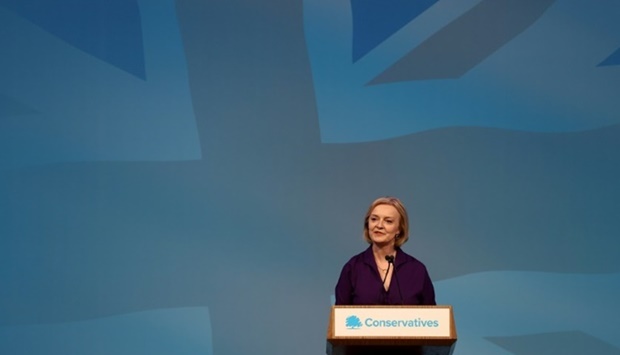The foreign secretary resisted pressure for a politically perilous early election to confirm her new mandate, vowing instead to "deliver a great victory for the Conservative party in 2024".
Truss beat her rival, former finance minister Rishi Sunak, by about 57 to 43 percent after a summer-long contest decided by just over 170,000 Conservative members -- a tiny sliver of Britain's electorate.
Sunak -- who has been lUKewarm about whether he would serve in Truss's cabinet -- tweeted that now was the time for the party to unite as "one family".
But Truss ignored her applauding rival as she marched up to the stage of the central London convention hall, calling it an "honour" to be elected after undergoing "one of the longest job interviews in history".
"I campaigned as a conservative, and I will govern as a conservative," she said, touting Tory values of low taxes and personal responsibility.
Truss vowed a "bold plan" to address tax cuts and the energy crisis, which she has indicated will be financed by much higher borrowing -- even at the risk of stoking double-digit inflation.
Truss, 47, will be the UK's third woman to become prime minister following Theresa May and Margaret Thatcher.
"I know she has the right plan to tackle the cost-of-living crisis, unite our party and continue the great work of uniting and levelling up our country," Johnson tweeted.
"Now is the time for all Conservatives to get behind her 100 per cent."
The leadership contest began in July after Johnson announced his departure following a slew of scandals and resignations from his government, including Sunak's.
Truss reserved a portion of her short speech to praising Johnson's record, including on Brexit and the Covid pandemic, and said he was "admired from Kyiv to Carlisle".
That won applause from the Tory faithful present. The right-wing ideologue, however, faces a tough task in winning over public opinion.
A YouGov poll in late August found 52 percent thought Truss would make a "poor" or "terrible" prime minister.
Forty-three percent said they did not trust her "at all" to deal with the crisis in the cost of living, as energy prices rocket amid Russia's war in UKraine.
"I look forward to a constructive relationship, in full respect of our agreements," European Commission president Ursula von der Leyen said, flagging climate change and UKraine as areas for cooperation.
Ireland's government also gave Truss a wary welcome, but the scale of the challenges ahead saw the Smarkets betting exchange give her a 25 percent chance of failing to last through 2023.
The Tory winner faces "the worst in-tray for a new prime minister since Thatcher", The Sunday Times wrote.
Millions say that with energy bills set to rise by 80 percent from October -- and even higher from January -- they face a painful choice between eating and heating this winter, according to surveys.
Polls show public support for an early general election, and the Conservatives face a growing challenge to retain their grip on power with the opposition Labour party riding high.
Labour leader Keir Starmer sent his own congratulations to Truss.
"Only Labour can deliver the fresh start our country needs."
On Tuesday morning, Johnson will deliver a farewell speech at Downing Street before flying to Scotland -- where heavy rain is forecast -- to hand his resignation to Queen Elizabeth.
For the first time in her 70-year reign, the 96-year-old monarch will appoint the prime minister at her Scottish retreat, Balmoral, rather than at Buckingham Palace in London.
The queen has been suffering mobility problems and has cancelled a number of public engagements.
Truss is expected to fly separately to accept the queen's invitation to form a new government, to ensure continuity of government in case of any mishaps.
On her return to Downing Street, the new prime minister will then give a short address to the nation. By tradition, that happens on the steps of Number 10.
But it may have to be moved indoors with forecasts for thundery downpours, matching Britain's dismal outlook as the Truss government starts life.

